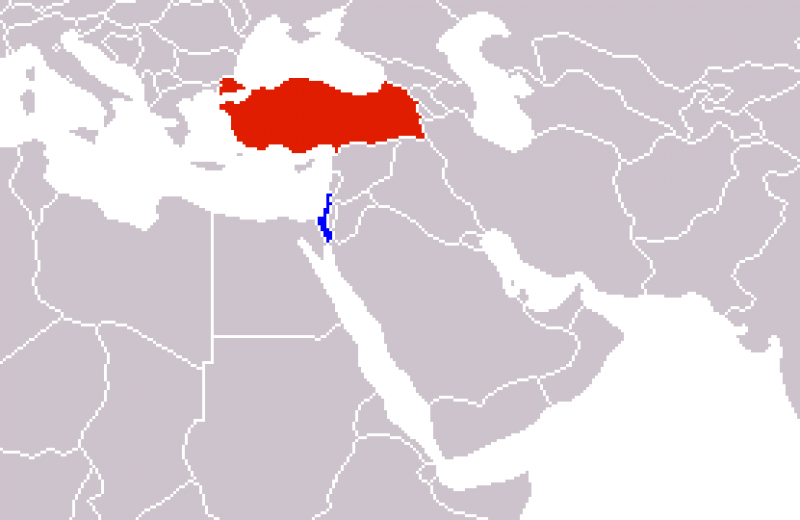 Op-eds
/ Israel and the East Mediterranean
Op-eds
/ Israel and the East Mediterranean
Turkey and Israel face a unique opportunity: to reconcile after five years of stagnant bilateral relations. We, leaders of Israeli and Turkish think tanks that have been working together since 2012 to support the mending of Israel-Turkey relations, welcome this development and call on the leaders of both countries to seize this opportunity.
In mid-December, officials from both countries met in Switzerland in order to finalize principles for an eventual agreement to normalize ties. Reports confirm that an outline and framework for the reconciliation agreement has indeed been reached, although some important issues – such as the blockade on the Gaza Strip – are still unresolved. Israel and Turkey came close to sealing a reconciliation deal on several occasions since the 2010 Mavi Marmara incident, most recently in the spring of 2014. However, while diplomats managed to find formulas that would overcome the differences between the countries, political leadership in Ankara and Jerusalem was hesitant to put the agreement into practice. This time around, there seems to be a convergence of economic and geostrategic interests, as well as political will on both sides.
Signs of this steady and deliberate warming have appeared more frequently in recent months. Triggered by joint economic interests over Eastern Mediterranean natural gas discoveries, as well as mutual concern over developments in Syria, Israel and Turkey committed themselves to a sequence of steps that would create a better public atmosphere, and expand upon preexisting areas of cooperation.
Days before the meeting in Switzerland, Turkish President Recep Tayyip Erdoğan stated that Israel-Turkey reconciliation “would be good for us, Israel, Palestine and the entire region.” These sentiments were also expressed by Israel’s Foreign Ministry Director General, Dore Gold, who emphasized “Israel has always strived for stable relations with Turkey and is constantly examining ways to achieve that goal.” In the last five years, statements of this nature were virtually nonexistent.
Since reports of the meeting first aired, additional positive statements were voiced. Turkish Deputy PM Ömer Çelik’s stated that “without a doubt, the state of Israel and the Israeli people are friends of Turkey.” Israeli Energy Minister Yuval Steinitz said, “There is a serious, meaningful chance for thawing and normalizing relations between Israel and Turkey,” and that this is a huge opportunity for cooperation regarding natural gas.
The leaders of Israel and Turkey should not let this opportunity slip away. Rather, they should capitalize on the current good will and positive momentum, move expeditiously to resolve their remaining differences, sign a reconciliation agreement and restore full diplomatic ties.
Such a deal will not only serve the immediate interests of both countries but it would also contribute to regional security and stability by countering the advance of violent extremism in the Middle East. Moreover, it may also enable Turkey to become a more significant and constructive player in efforts to reconstruct Gaza, support inter-Palestinian reconciliation and promote the Israeli-Palestinian peace process.
In his statement on the topic, President Erdoğan said, “I don’t believe the Israeli public is pleased with the current state of relations.” Indeed, an October 2015 public opinion poll conducted by Mitvim (the Israeli Institute for Regional Foreign Policies) showed that the Israeli public sees reasons for mending ties with Turkey, with prospects for security cooperation on the Islamic State of Iraq and the Levant (ISIL) and Syria topping the list. In Turkey too, there seems to be wide support for the move, as reflected by a statement of Turkey’s main opposition leader, Kemal Kılıçdaroğlu, who welcomes rapprochement with Israel.
Signing this agreement is a crucial step forward but more efforts will be required in order to restore mutual trust and understanding between our societies and to develop a new narrative in Israel-Turkey relations. In particular, the two countries should work to restoring mutual trust, constructively market the reconciliation agreement to their respective publics, establish diverse official channels of communication, advance new economic initiatives, launch mechanisms for joint analysis and coordination regarding regional events, engage in mutual conflict resolution support and increase dialogue between civil society organizations and new elites.
In particular, civil society organizations – think tanks, universities, and NGOs – should be encouraged to engage in this process. As our experience working together over the last few years has proven, such independent efforts can make impactful contributions to the transformation of bilateral relations.
Turkey and Israel are on the verge of opening a new chapter in their relationship that will potentially contribute to peace, safety, and prosperity in both countries and within the region. Let’s seal the deal.


